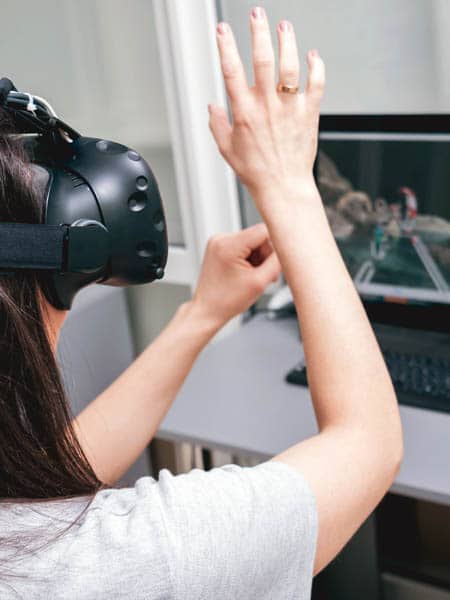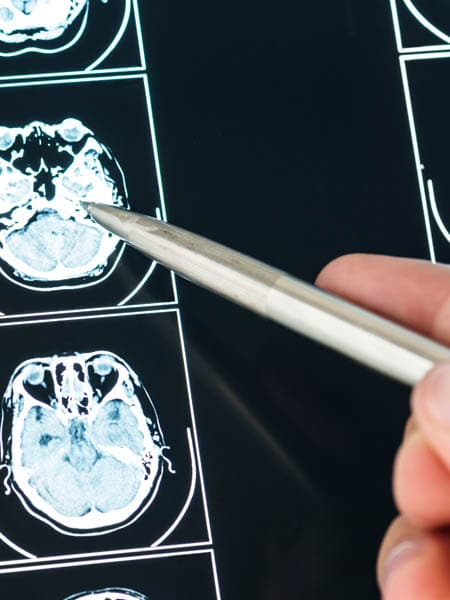A Blending of Vision and Rehabilitation
Neuro-rehabilitative optometry is defined as an individualized treatment program for children or adults struggling with visual difficulties as a result of a physical disability, traumatic brain injuries or other events that result in damage to the neurological system. It is a blending of vision and rehabilitation.
This form of treatment is a process designed to help children and adults resolve visual problems that are a result of a functional disorder and/or disorders that affect their visual-perceptual and eye motion skills.
What conditions can Neuro-Rehabilitative Optometry treat?
Individuals, regardless of age, who have suffered an event or disease that damaged their neurological systems can benefit from this type of vision eye therapy. Some of the conditions that may be helped are:
- Cognitive deficits
- Visual-spatial dysfunction
- Binocular dysfunction
- Accommodation or convergence difficulties
- Oculomotor dysfunction
- Visual perceptual deficits
- Acquired strabismus
- Siplopia
- Visual difficulties caused by stroke
- Visual disturbances associated with cerebral palsy
- Visual problems often seen in conjunction with multiple sclerosis

All of the vision problems listed to the left can take their toll on an individual’s learning ability or ability to perform at work. Neuro-rehabilitative optometry can improve or alleviate these difficulties through a course of individualized treatment. It can also help with conditions that may be made worse by visual disturbances. Problems with balance and episodes of vertigo can be diminished or alleviated with a prescribed plan of neuro-rehabilitative therapy.
How will I know if I need neuro-rehabilitative optometry?
After a brain injury occurs, whether it is from outside trauma such as a car accident or there is damage from a medical event such as a stroke, the individual is often left with a communication problem between what the eyes see and how the brain interprets that information. If there is a disruption in the smooth flow of information between your brain and your eyes because of an injury or disease, vision difficulties are a common occurrence.
If you’ve suffered an injury, illness or trauma, you may benefit from the services of a neuro-rehabilitative optometrist if you are experiencing any of the following:
– Any degree of loss of vision
– Lack of coordination, increased clumsiness or dizziness
– Frequent headaches, especially after doing close work or computer work
– Sensitivity to light or difficulty determining contrast
– A shortened attention span or loss of concentration
– Problems walking or maintaining balance, such as bumping into objects
– Difficulty judging depth perception
– Discomfort in the eyes, head or neck when reading
Most people who develop a neurological problem begin looking for help by visiting their primary care physician. They may mention their neurological symptoms to the doctor, who may refer the individual to a rehabilitative therapist. This therapist will probably suggest getting a routine eye examination. If there are also balance issues involved, a physical therapy or occupational therapy referral may be suggested. All of these measures may afford some degree of relief, at least on a temporary basis.
What will treatment by a neuro-rehabilitative optometrist look like?
A referral to a neuro-rehabilitative optometrist will result in the development of a treatment plan based on your specific symptoms and difficulties. The goal of the plan will be the improvement or elimination of the specific visual deficits that are identified in the initial vision and neurological examination. Treatment can include the use of specialized lenses and prisms. Your eye care professional may develop a specific regimen of exercises and treatments using prescribed occlusion and optometric visual aids and devices. You may have ‘homework’ assigned to be done at home. This usually requires interaction with a special computer program.
Conclusion
People who have suffered a neurologic injury or disease affecting the nervous system often develop problems in processing visual information. These problems can be quite problematic, even debilitating. The effects of these difficulties, such as experiencing visual stimulation overload in a grocery store or triggering an episode of vertigo, can be quite disturbing. Neuro-rehabilitative optometry is designed to manage, improve and possibly eliminate these problems.

CONTACT US
Vision Care & Therapy Center

Dr. Janna Iyer, FCOVD
Dr. Alayna Larsen
11735 Pointe Place
Roswell, Ga 30076
678-256-3990
Office Hours
Mon-Thu 9:00am-6:00pm
Fri 9:00am-1:00pm
Appointments
678-256-3990
Patient Infomation


